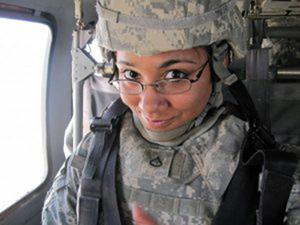
Morganne had always been patriotic—once she colored strands of her long black hair red, white and blue—and she was smart, friendly, gregarious and popular, so it wasn’t a surprise when she ended up in the 82nd Airborne as a paramedic and quickly made friends throughout her military company.
The thrill of training as a paratrooper ended when McBeth’s 1st Brigade Special Troops Battalion, 82nd Airborne of Fort Bragg, N.C., was deployed to Iraq in the summer of 2009. These specialty troops—paramedics, drivers, secretaries—suddenly found themselves enclosed within the desolate Al-Asad air base in northwestern Iraq.
The battalion made it through its 12-month tour relatively unscathed, and some of its soldiers, including McBeth, were scheduled to be sent home. Energized and relieved, she posted this on her Facebook page:
“Back to the land where we are surrounded by people we love and love us the same. Enjoying the sweet smell of rain and the relaxing sounds of birds chirping in the morning. Vast lands to explore—it’s going be great and it’s going be soon.” As people her age sometimes do, McBeth ended the note with a smiley face.
Within seven days of writing that post, and just a handful of days before she was to come home, she was dead.
She died on the early morning of July 2, 2010, on an operating table as military doctors tried desperately to save her from a stab wound that started just below her right collarbone and went down into a lung and her heart.
Soon, the Army declared the death “noncombat related” and essentially closed the case, saying it was the result of an accident. But for the McBeths, there was no closure. They pressed for justice, and eventually arrests were made. However, those arrests did little to satisfy the family, which believes that the Army has been covering up a more serious crime by undertaking prosecutions of lesser charges.
The killing of Spc. Morganne McBeth was no accident, her relatives say. On the basis of the limited evidence that they have, they see the Army’s version of what happened as farfetched, and some familiar with the case—even some Army people—agree with that conclusion.
Relatives say that trying to answer the question of what, exactly, happened to McBeth has become a guessing game that gnaws at them day and night because military investigators from the Army’s Criminal Investigative Command, known as the CID, which investigates all noncombat deaths, have offered so little information. And in the course of revealing those few facts, the investigators have managed to increasingly confuse and anger the family.
The family says the military has turned its back on them, a complaint often heard from those coping with the noncombat death of a military member. “The military told us they were going to do right by Morganne; they told us this many times,” lamented Sylvia McBeth. The McBeths say that an Army casualty assistance officer, a woman, tried to pry more information out of the CID but after several months suddenly said she could no longer help them.
To continue reading this story, click here.
Also see these Toward Freedom articles on this issue by John Lasker:
Sexual Violence Against Women in the US Military: The Search for Truth and Justice
Speaking Out: US Military Sexual Violence and Trauma Against Women
